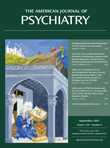To The Editor: Drs. van Grootheest and Cath raise important issues about compulsive hoarding but are mistaken on a few points that deserve clarification.
First, they state that they do not agree that many hoarding individuals do not have other OCD symptoms, based on the cohort examined by Dr. Samuels et al., in which all but six hoarding patients had other OCD symptoms. However, subjects in that study were recruited from families with OCD and were excluded if they did not meet DSM-IV criteria for OCD. Studies that specifically recruited compulsive hoarding patients have found that many of them do not have other OCD symptoms. Grisham et al.
(1) reported that 43% of the compulsive hoarding patients they examined had no other OCD symptoms at all. Wincze et al.
(2) found that only two of the 21 compulsive hoarding patients in their cohort had any non-hoarding OCD symptom. Moreover, hoarding symptoms do not correlate strongly with other OCD symptom factors
(3), suggesting that compulsive hoarding may be a separate disorder that is not always comorbid with non-hoarding OCD.
Drs. van Grootheest and Cath point out that hoarding in itself is heterogeneous. This is why it is important to distinguish compulsive hoarding from non-compulsive hoarding behaviors observed in other disorders, such as schizophrenia, dementia, and Prader-Willi syndrome. Unlike compulsive hoarding, these other types of hoarding behaviors are not driven by obsessional fears of losing valuable or important items, but rather are related to delusions, an inability to clean because of cognitive impairment, or are stereotypic rituals. Clarke et al.
(4) made a clear distinction between the ritualistic and stereotypic behaviors—including hoarding—which they commonly observed in Prader-Willi patients, and obsessive-compulsive symptoms, which they almost never found.
In contrast, clinical compulsive hoarders are remarkably similar to one another. The vast majority of these individuals display the same constellation of symptoms and features: urges to save items; fears of losing items that might be valuable or meaningful; avoidance of discarding; indecisiveness; perfectionism; procrastination; disorganization of possessions and activities; and circumstantial, overinclusive language. These similarities among individuals with compulsive hoarding syndrome, their differences from non-hoarding OCD patients, and their markedly different brain activity
(5), support the hypothesis that compulsive hoarding is a discrete syndrome
(5,
6) .
Drs. van Grootheest and Cath correctly state that genetic linkage results must be replicated “before we can conclude that there is a [specific] susceptibility locus for hoarding.” However, as with most other psychiatric disorders, there are probably several genes that confer risk for compulsive hoarding. The OCD Collaborative Genetics Study is the third study to find genetic markers specifically associated with compulsive hoarding, indicating that it is a distinct and heritable phenotype. Other studies have confirmed that compulsive hoarding is strongly familial
(7) and appears to breed true
(8) . Future genetic studies should be conducted on populations with the more homogeneous and well-defined categorical phenotype of compulsive hoarding syndrome in order to identify the specific genes involved in its etiology.

